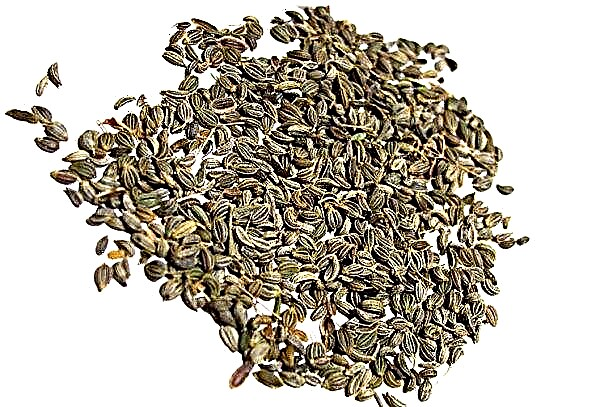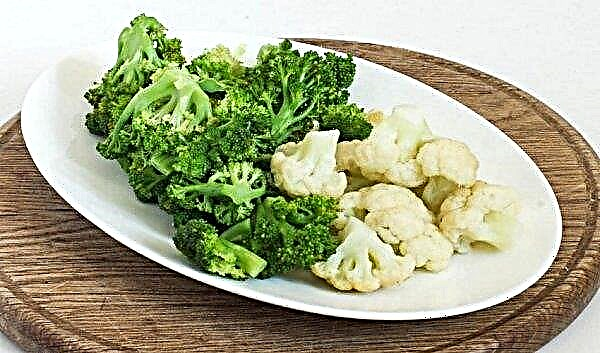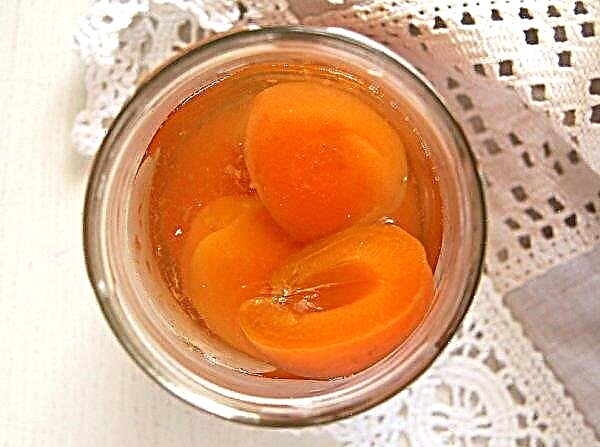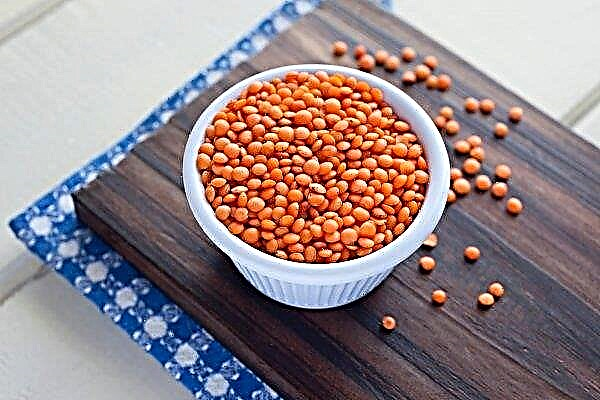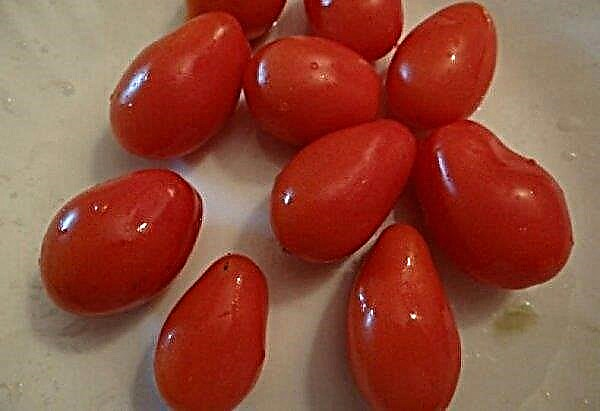Tomato is a delicious vegetable that is of great value to human health. It is used for culinary, medical and even cosmetic purposes. Nevertheless, the intake of tomatoes is associated with a detrimental effect when, for health reasons, a person should not use this product. That is why it is worthwhile to figure out what useful and harmful properties tomatoes have and what contraindications to their use exist.
Composition and content of substances
Tomatoes are rightfully considered a storehouse of nutrients. Indeed, they contain a significant amount of vitamins, macro- and microelements.
Among the main ones are:
- vitamins A, B1, B2, PP, B4, B5, B6, B9, H, C, E, K;
- glucose;
- fructose;
- pectin;
- starch;
- carotenoids;
- cellulose;
- lycopene;
- xanthophyll;
- iodine;
- iron;
- calcium;
- silicon;
- sodium;
- magnesium;
- sulfur;
- phosphorus;
- chlorine.
Did you know? Another name for the plant, “tomato,” has Aztec roots, since it was called “tomato” in their language.
Calorie Tomatoes
Calorie content of the product depends on the variety.
On average, KBZhU indicators per 100 g are as follows:
| Squirrels | 1.1 g |
| Fats | 0.2 g |
| Carbohydrates | 3.7 g |
| Calorie content | 20 kcal |
There are less high-calorie species. So, in 100 g of cherry tomatoes are only 14 kcal. The energy value of preservation depends on the amount used in the preparation of spices, but on average it does not exceed the calorie content of a fresh product.

Useful properties and harm of tomatoes
Tomatoes of various varieties and species have many useful and even medicinal properties. Many people are afraid to eat artificially bred varieties, because they believe that they are less useful, but this is not so. Contrary to popular belief, a positive effect should also be expected from hybrids.
- Useful properties of tomatoes include:
- strengthening the musculoskeletal system;
- muscle protection against sprains;
- recovery of the body, in particular, the brain and liver, after alcohol intoxication;
- cancer prevention;
- preservation of vision;
- lower cholesterol;
- improvement of the circulatory and cardiovascular systems;
- prevention of Alzheimer's and Parkinson's diseases;
- normalization of bowel movements;
- healing effect on the skin;
- improved metabolism;
- normalization of lung function;
- strengthening immunity due to the presence of useful nutrients in the composition, which is especially useful for pink tomatoes, which contain 1/3 more dry matter;
- low calorie content, especially in yellow and orange varieties;
- preservation of vitamins and minerals during cooking, which makes salted and pickled tomatoes no less useful.

Despite an impressive list of beneficial properties, tomatoes can adversely affect the body.
- Among the possible harmful effects of taking the product are the following:
- an allergic reaction when eating red fruits - in this case, you can use yellow and orange;
- dysfunction of the liver and gastrointestinal tract with an excess of the product;
- increased acidity in the stomach (yellow and orange varieties containing less acid are the exception);
- the presence of vinegar, salt, and sugar in pickled tomatoes can be detrimental to people with health problems.
For men
Tomatoes bring particular benefit to the male sex, as they have a positive effect on the condition of the prostate. This vegetable is an excellent prophylactic against adenoma and prostate cancer, as well as prostatitis. Moreover, with regular intake of tomatoes, the likelihood of inflammation of the prostate gland is only 25%.
For women
The vegetable in question is simply indispensable during pregnancy. It contains folic acid, the preparation of which is especially important for expectant mothers in the first trimester, for which more tomatoes should be added to the diet. Also, it is important for women in premenopausal women to think about the daily intake of tomatoes, since the useful elements in the composition of the vegetable help smooth out the unpleasant symptoms of menopause.

Features of use
Given the characteristics of the product and its composition, some people with health problems should be careful to include it in the diet. It is especially important to approach nutrition with liver diseases, pancreatitis, diabetes, hypertension and overweight. In these cases, you need to understand what benefits and harm tomatoes can do and whether they can be eaten at all.
For diabetics
Recommendations for eating or eliminating tomatoes from the diet of diabetics depend on the type of disease.
- At type 1 this vegetable will be useful because patients lack insulin, and carbohydrates are required to restore balance. However, in this case, tomatoes should not be eaten more than 300 g per day.
- 2 type involves eating only fresh tomatoes in a minimal amount. The consumption rate should be calculated by each individual patient, based on an individual daily calorie content.
Important! Tomato preservation in type 2 diabetes is strictly prohibited.
With hypertension
With hypertension, it is important to consume vegetables, since they improve the functioning of the human cardiovascular system and normalize blood functions. For this reason, hypertension should have more than 250 g of tomatoes per day in the diet. They need to be consumed fresh. Tomato preservation should be discarded, since pickles and pickled vegetables at high pressure only harm.
For the liver
In the normal functioning of the liver, tomatoes are involved in organ cleansing. If in the history there are diseases associated with liver dysfunction, the use of the product must be approached wisely. To remove stones from the hepatic ducts before dinner, you need to eat 1 tomato. With cirrhosis, you can use them fresh, but it is especially useful to drink freshly prepared tomato juice.
You should also exclude salted and canned vegetables and juices from them.

For the pancreas
The vegetable in question violates the secretory functions of the stomach and pancreas. Therefore, in the acute form of pancreatitis, it should be removed from the diet. If with chronic pancreatitis the doctor notes the onset of persistent remission, the vegetable can be eaten in reasonable doses. In this case, it is better to get rid of the skins, thoroughly chop and heat the tomato.
When losing weight
Due to the extremely low calorie content, tomatoes are considered a great option for a diet when losing weight. In addition to low energy value, this product is rich in fiber, which helps to remove excess from the digestive tract. Since the vegetable contains mainly carbohydrates, it is better to eat it for breakfast or lunch. Specific standards depend on the type of diet, daily calorie intake and other individual factors.

Contraindications
Before eating tomatoes, make sure that you have no contraindications to their use.
These include:
- allergy to the described vegetable;
- gallstones
- gastritis with high acidity;
- stomach ulcer;
- acute pancreatitis;
- arthritis;
- kidney pathology;
- gout;
- taking medications based on potassium.
Important! In the presence of serious pathologies, you should definitely consult a doctor before introducing tomatoes into the diet.
Features of the use of tomatoes in cosmetology
In addition to cooking, tomatoes are also used in the cosmetic field. The beneficial properties of the vegetable affect the appearance. To a greater extent, tomatoes affect the skin: they are used to nourish, tone, rejuvenate, strengthen the skin, improve the functioning of the sebaceous glands and narrow pores.
At home, they make face masks from them. Best of all, they help in conjunction with ingestion.
The basic rules for choosing good tomatoes
In order for the tomato to bring maximum benefits, it is necessary to choose the best fruits.
They have the following properties:
- smooth skin without cracks and wrinkles;
- lack of suspicious spots and a raid;
- dense structure;
- uniform color.
Did you know? From a botanical point of view, tomatoes are berries. However, in 1893, a lawsuit was held in the United States regarding which type of fruit a tomato belongs to. The supreme judge pronounced the verdict, calling it a vegetable, since these fruits are eaten for lunch and not served for dessert.
Useful Cooking Tips
Tomatoes belong to those products that can be prepared in completely different variations.
To make each dish with his participation enjoy and benefit, try to use the following tips:
- the vegetable retains the best taste if it is stored not in the refrigerator, but at room temperature;
- do not be afraid of experiments - you can cook almost anything with tomatoes: salads, soups, sauces, pies, omelets, side dishes, pizzas, juices, stews and even sweet dishes;
- it is not worth taking out the peel and seeds from the fruits, however, if according to the recipe you need to get rid of the skin, it is better to blanch the vegetable before the procedure;
- tomatoes are combined with rosemary, garlic, celery, parsley and thyme.

The benefits of tomatoes for the body are very great, so this vegetable deserves to be included in the diet. Despite this, a tomato can affect and not in the best way, causing harm to a person. If you properly treat your diet and eat tomatoes in the right amount and in the right form, this product will only bring benefits.


